Stories about...Electrical and Computer Engineering
 CISTEME365 Provides Year-Round PD/Community to Illinois Teachers in Support of Informal STEM Education Efforts to Underserved Students
CISTEME365 Provides Year-Round PD/Community to Illinois Teachers in Support of Informal STEM Education Efforts to Underserved Students
January 4, 2021
As part of its year-round emphasis, CISTEME365 (Catalyzing Inclusive STEM Experiences All Year Round) held an all-day professional development (PD) session on Wednesday, December 2nd, for educators from eight participating schools. An initiative of the University of Illinois’ Grainger College of Engineering, in partnership with NAPE (the National Alliance for Partnerships in Equity), CISTEME365 provided the PD session via Zoom, incorporating videos and printed materials, as well as using materials from kits that had been mailed participants. The goal of the session was to provide educators with equity/inclusion training, plus allow them to experience for themselves hands-on, project-based learning activities prior to having the students in their clubs try them out.
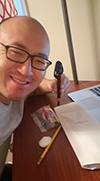 CISTEME365 Virtual Institute Equips Teachers to Expose Underserved Students to STEM Via Extracurricular STEM Clubs
CISTEME365 Virtual Institute Equips Teachers to Expose Underserved Students to STEM Via Extracurricular STEM Clubs
July 31, 2020
For five days during the period from July 20–30, CISTEME365 (Catalyzing Inclusive STEM Experiences All Year Round), a three-year, NSF-funded program in its second year, held its summer 2020 CISTEME365 Virtual Institute. Its goal? To equip educators to give students quality informal learning opportunities outside of the classroom. The idea was for teams from eight different schools to form or bolster already-existing clubs that pique the interest of under-represented students in STEM (Science, Technology, Engineering, and Math), with the long-term goal of increasing the diversity in STEM.
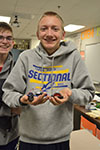 MSHS STEM Club Seeks to Pique High Schoolers’ Interest in STEM Via Hands-on Activities, Exploring STEM Careers
MSHS STEM Club Seeks to Pique High Schoolers’ Interest in STEM Via Hands-on Activities, Exploring STEM Careers
December 17, 2019
What’s something that teenagers might find so exciting that they’d roust themselves out of bed early on a Monday morning in order to show up at school by 7:15 AM? STEM! To be specific, the Mahomet-Seymour High School (MHSH) STEM Club, which has met every Monday morning since it was begun in late August, exposing between 15–25 young people to STEM hands-on activities and STEM careers each week.
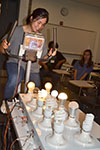 Banerjee and Bose Empower/Recharge Educators During CISTEME365 Session About Power and Energy
Banerjee and Bose Empower/Recharge Educators During CISTEME365 Session About Power and Energy
September 16, 2019
In the recent CISTEME365 Institute from July 22–August 3, 2019, two rising stars in Electrical and Computer Engineering (ECE), Assistant Professors Subhonmesh Bose and Arijit Banerjee, presented a session on their areas of research—power and energy— to 13 educators participating in the institute. Part of the 3-year NSF grant, Catalyzing Inclusive STEM Experiences All Year Round CISTEME365, their integrated presentation walked through a history of power systems, the physics behind electromechanical energy conversion, and shared research frontiers in power and energy. Plus, a dialogue ensued where both the K–12 and higher education teachers discussed STEM pedagogy beneficial for all ages.
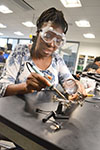 Five Schools Tap into CISTEME365 Resources to Begin STEM Clubs, Pique Student Interest in STEM
Five Schools Tap into CISTEME365 Resources to Begin STEM Clubs, Pique Student Interest in STEM
September 12, 2019
With the goal of increasing the number of their students, especially girls and minorities, who become interested in, and possibly choose careers in STEM (Science, Technology, Engineering, and Mathematics), 13 teachers from five schools are participating in Electrical and Computer Engineering’s new NSF-funded grant, CISTEME365 (Catalyzing Inclusive STEM Experiences All Year Round). The main objective of the program is for the educators to begin after-school STEM clubs in their schools. As part of the program, for two weeks this past summer, from July 22–August 3, 2019, the schools sent Idea Teams to campus for the first CISTEME365 Institute. There, the educators learned how to foster equity and inclusion, tried out hands-on activities that would expose students in their clubs to STEM, and networked with other educators excited about STEM.
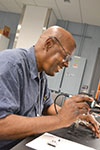 CISTEME365 Seeks to Increase Underrepresented in STEM—Trains Teachers to Start STEM Clubs
CISTEME365 Seeks to Increase Underrepresented in STEM—Trains Teachers to Start STEM Clubs
September 10, 2019
According to statistics, women and minorities are underrepresented in STEM (Science, Technology, Engineering, and Math). So, for years, Electrical and Computer Engineering (ECE) Professor Lynford Goddard has been exposing high school girls, including minorities, to electrical engineering via cutting-edge-yet-fun hands-on activities in his GLEE (Girls Learn Electrical Engineering) camp, which, to foster inclusion, included boys as well this past summer. Now, he hopes to significantly increase the number of high schoolers he impacts annually from the 21 or so he’s been working with in GLEE, to significantly more than that—at least 1,000—through his 3-year NSF grant, Catalyzing Inclusive STEM Experiences All Year Round (CISTEME365). Plus, Goddard hopes to pass on not just some of his expertise, but the materials he’s developed over the years, to teachers who will use what they learn to begin after-school STEM programs.
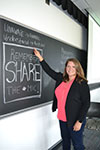 Meagan Pollock Encourages CISTEME365 Educators to Reach and Teach Every Student
Meagan Pollock Encourages CISTEME365 Educators to Reach and Teach Every Student
September 4, 2019
As part of the NSF grant, Catalyzing Inclusive STEM Experiences All Year Round (CISTEME365), 15 teachers from five schools visited Illinois for the first CISTEME365 workshop. Their goal was to receive training needed to begin after-school STEM clubs in their schools. Because CISTEME365 is targeting students often underserved in STEM, including women and minorities, the first week’s emphasis was equity training taught by Meagan Pollock of the National Alliance for Partnerships in Equity (NAPE). The message of the week-long institute was simple: reach and teach every student.
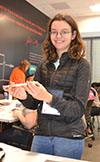 2019 GLEE Camp Exposes High School Students to Electrical Engineering Via Hands-On Projects
2019 GLEE Camp Exposes High School Students to Electrical Engineering Via Hands-On Projects
June 24, 2019
Electrical and Computer Engineering's (ECE) GLEE camp recently celebrated its tenth successful year of operation. Familiar faces, such as ECE Professor Lynford Goddard and a team of ECE students and faculty, returned to serve as instructors for the 2019 camp. Previously, the camp was exclusively for girls, however, this year, GLEE opened up and welcomed students of all genders. Nineteen girls and two boys from east-central Illinois, the Chicago area, and even two from out of state experienced a high-quality program with exposure to what studying Electrical and Computer Engineering at Illinois is like.
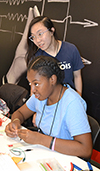 GLEE GAMES Camp Seeks to Spark High School Girls' Interest in Electrical Engineering
GLEE GAMES Camp Seeks to Spark High School Girls' Interest in Electrical Engineering
June 28, 2018
Ever flip a switch and marvel at the magic of electricity accomplishing a task? During the week of June 17–23, the 17 high school girls who participated in GLEE (Girls Learning Electrical Engineering) G.A.M.E.S. (Girls’ Adventures in Mathematics, Engineering, and Science) camp not only learned about Electrical Engineering, but they did some engineering themselves. And helping lead the activities were several female ECE students—role models who demonstrated that girls can become electrical engineers.
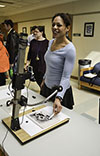 I-MRSEC: Creating a Multidsciplinary Materials Research Community
I-MRSEC: Creating a Multidsciplinary Materials Research Community
March 15, 2018
"The more that people understand the scientific basis of the world and of their lives and of what people are doing and researching and care about, the more we care about each other and the more we support each other." – Nadya Mason
Begun in September 2017, I-MRSEC (Illinois Materials Research Science and Engineering Center), a new NSF-funded center, seeks to create a community around multidisciplinary materials science research, recruiting and educating the next generation of researchers, including diverse students, and informing the general public through outreach. Funded through NSF’s Division of Materials, the Center will receive $16 million over the six years of the grant, with the possibility of being renewed.
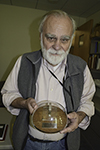 Jont Allen’s ECE 298 JA Course Reinforces Engineering Math Fundamentals While Surveying the History of Mathematics
Jont Allen’s ECE 298 JA Course Reinforces Engineering Math Fundamentals While Surveying the History of Mathematics
December 11, 2017
How well do AP students do on Illinois’ engineering math courses? To answer that question, about 12–15 years ago, a joint group of Illinois math and engineering professors studied the issue. While there is a strong correlation between AP scores of incoming students and how well they do in subsequent engineering math courses — students who get 5’s typically get A’s, 4’s get B’s, etc. — the study also discovered a great deal of variance and overlap between scores: though most students follow the norms, some end up getting A’s while others get D’s. Jont Allen, a professor in the Electrical and Computer Engineering (ECE) Department at Illinois, sees this enormous variability as a problem, so he set out to correct it. He created his own class, ECE 298 JA (his initials), to refresh incoming students in engineering fundamentals while teaching them the history of mathematics.
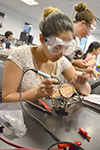 Girls Explore Electrical and Computer Engineering During GLEE GAMES Camp
Girls Explore Electrical and Computer Engineering During GLEE GAMES Camp
October 20, 2017
At the 2017 G.A.M.E.S. (Girls’ Adventures in Mathematics, Engineering, and Science) camp during the week of June 18–24, 14 students attended the GLEE (Girls Learning Electrical Engineering) portion of the camp. These 14 girls included 7 from the suburbs of Chicago, 4 from out of state, and even one international student from Turkey. GLEE allowed girls to get their hands on electrical engineering components in a week-long adventure in circuitry and solar power.
GLEE has been run by ECE (Electrical and Computer Engineering) professor Lynford Goddard for the past eight years. This year, his 14 students undertook a couple of projects to get them familiar with the core concepts of circuitry and electrical engineering.
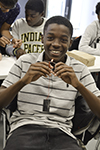 ECE Day at I-STEM’s Multidisciplinary Summer Camp: Soldering, Circuits, and Software
ECE Day at I-STEM’s Multidisciplinary Summer Camp: Soldering, Circuits, and Software
October 5, 2017
“The earlier you get exposed, the better you'll be at it…because it's something you've seen before.” —ECE Graduate Student Lonna Edwards
What is Electrical and Computer Engineering (ECE) anyway? On Thursday, August 10, 27 Urbana High School (UHS) student athletes found out a little about it at the I-STEM Summer Camp’s ECE Day, when ECE’s Lynford Goddard and several students from his lab exposed the campers to some activities related to ECE. Students learned about then did hands-on activities about research experiment design, how to solder, and how to build circuits. In addition to learning about the field, students also interacted with several ECE graduate students and discovered a bit about what being an engineering student might be like.
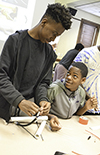 I-STEM Multidisciplinary Summer Program Exposes UHS Athletes to Different STEM Departments/Units
I-STEM Multidisciplinary Summer Program Exposes UHS Athletes to Different STEM Departments/Units
September 12, 2017
Twenty-seven Urbana High School (UHS) athletes, mostly underrepresented minorities, participated in the first-ever I-STEM Summer Camp from August 7–18. The goals of this multidisciplinary summer program were to 1) expose participants to various STEM fields so they know what their options are when choosing their career/ college path; 2) to build teamwork and lab skills in different STEM disciplines; and 3) to allow students to experience what STEM research is about. Ten different STEM departments and units on campus were each responsible for one day of activities during the two-week camp.
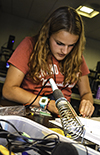 Girls Experience Electrical Engineering First-Hand at the 2016 GLEE G.A.M.E.S. Camp
Girls Experience Electrical Engineering First-Hand at the 2016 GLEE G.A.M.E.S. Camp
July 6, 2016
During the 2016 edition of the GLEE (Girls Learning Electrical Engineering) G.A.M.E.S. (Girls' Adventures in Mathematics, Engineering, and Science) camp the week of June 19th–25th, 19 campers from across the US (and even one international student) not only got their heads around what Electrical and Computer Engineering (ECE) is like...they got their hands around it too. First they learned about a range of things related to ECE, like circuits, signal processing, imaging, optics, antennas, etc., then implemented what they had learned in the classroom via some hands-on projects. The idea of the camp was to expose the girls to a variety of activities that would give them a taste of what Electrical and Computer Engineering is all about.
 ECE's Kitt Peterson Exposes Local Middle Schoolers to Rapid Prototyping
ECE's Kitt Peterson Exposes Local Middle Schoolers to Rapid Prototyping
May 6, 2016
While it will be several years before Champaign-Urbana’s current crop of middle school students get the keys to their own car, at least a number of them now have a key chain to put them on. And it’s one that they designed themselves, thanks to ECE graduate student Kitt Peterson and MechSE’s Education Coordinator, Joe Muskin, who developed a curriculum that introduces rapid prototyping to sixth graders. So during the 2015–2016 school year, around 90 middle school students at Jefferson, Franklin, and Edison Middle Schools learned how to use TinkerCAD, a free, online software, then designed key chains, which were then 3D printed.
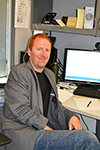 ECE's Daniel Wasserman Does "Whatever It Takes to Get Students to Learn"
ECE's Daniel Wasserman Does "Whatever It Takes to Get Students to Learn"
September 25, 2014
Assistant Professor Daniel Wasserman of Illinois' Department of Electrical and Computer Engineering (ECE) has never met a STEM education challenge he hasn't liked. While he enjoys working with Illinois engineering students (whom he says "are, of course, top, top students, and they're fantastic"), for a change of pace—and maybe a challenge—he likes to work with non-engineering college students, high school students, even grade-schoolers.
FULL STORY
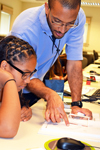 GLEE Campers Learn How Electrical Engineering Impacts Their Everyday Lives
GLEE Campers Learn How Electrical Engineering Impacts Their Everyday Lives
September 19, 2013
During the GLEE (Girls Learning Electrical Engineering) G.A.M.E.S. camp this summer, July 15–19, fourteen high school girls learned a bit about electrical and computer engineering and got to practice what they learned during some hands-on projects working with circuits. The goal was to take something near and dear to the hearts of teenage girls—their cell phones—and help them understand some of the principles that make them work.
FULL STORY
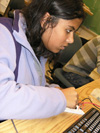 ECE 101 Engages Students by "Harnessing" Their Interests
ECE 101 Engages Students by "Harnessing" Their Interests
November 4, 2011
Illinois' General Education requirements are often viewed by students and teachers alike as exactly that—requirements to be gotten out of the way and checked off the list. To view these classes as opportunities to learn and grow is the perspective of the minority, and a few in this minority are doing something about it. At least two teachers in the Department of Electrical and Computer Engineering are trying to change the way students and educators view these basic requirements and are offering a class that pushes students to go beyond the minimum.
STORY













.jpg)















